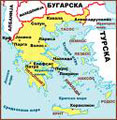| NSPM in English | |||
For Greece’s Economy, Geography Was Destiny |
 |
 |
 |
| недеља, 02. мај 2010. | |
|
(The New York Times, 25.4.2010)
Greece is where the historically underdeveloped worlds of the Mediterranean and the Balkans overlap, and this has huge implications for its politics and economy. For northern Europe to include a country like Greece in its currency union is a demonstration of how truly ambitious the European project has been all along. Too ambitious, perhaps, many Germans and other Northern Europeans are now thinking. That Europe’s problem economies — Greece, Italy, Spain and Portugal — are all in the south is no accident. Mediterranean societies, despite their innovations in politics (Athenian democracy and the Roman Republic) were, in the words of the 20th-century French historian Fernand Braudel, defined by “traditionalism and rigidity.” The relatively poor quality of Mediterranean soils favored large holdings that were, perforce, under the control of the wealthy. This contributed to an inflexible social order, in which middle classes developed much later than in northern Europe, and which led to economic and political pathologies like statism and autocracy. It’s no surprise that for the last half-century Greek politics have been dominated by two families, the Karamanlises and the Papandreous. It is also no accident that the budding European super-state of our era is concentrated in Europe’s medieval core, with Charlemagne’s capital city, Aix-la-Chapelle (now Aachen, Germany), still at its geographic center — close by the European Union power nexus of Brussels, The Hague, Maastricht in Holland and Strasbourg, France. This stretch of land, the spinal column of Old World civilization, is Europe’s richest sea and land interface. The Low Countries, with their openness to the great ocean and wealth of protected rivers and waterways inland, were ideal for trade, movement and consequent political development. The loess soil is dark and productive, even as the forests provided a natural defense. European antiquity was defined by the geographic hold of the Mediterranean, but as Rome lost its hinterlands, history moved north. It is not only the division between north and south that bedevils Europe. In the fourth century, the Roman Empire split into western and eastern halves, with dueling capitals at Rome and Constantinople. Rome’s western empire gave way to Charlemagne’s kingdom and the Vatican: Western Europe, that is. The eastern empire, Byzantium, was populated mainly by Greek-speaking Orthodox Christians, and then by Muslims after the Ottoman capture of Constantinople in 1453. The Carpathian Mountains, which run northeast of the former Yugoslavia and divide Romania into two parts, partly reinforced this boundary between Rome and Byzantium, and later between the prosperous Hapsburg Empire in Vienna and the poorer Turkish Empire in Constantinople. Greece is far more the child of Byzantine and Turkish despotism than of Periclean Athens. In antiquity Greece was the beneficiary of geography, the antechamber of the Near East — the place where the heartless systems of Egypt and Mesopotamia could be softened and humanized, leading to the invention of the West, so to speak. But in today’s Europe, Greece finds itself at the wrong, “orientalized” end of things. Yes, it is far more stable and prosperous than places like Bulgaria and Kosovo, but only because it was spared the ravages of Soviet-style communism. To see just how much geography and old empires shape today’s Europe, look at how former Communist Eastern Europe has turned out: the countries in the north, heirs to Prussian and Hapsburg traditions — Poland, the Czech Republic and Hungary — have performed much better economically than the heirs to Byzantium and Ottoman Turkey: Romania, Bulgaria, Albania and Greece. And the parts of the former Yugoslavia that were under Hapsburg influence, Slovenia and Croatia, have surged ahead of their more Turkish neighbors, Serbia, Kosovo and Macedonia. The breakup of Yugoslavia in 1991, at least initially, mirrored the divisions between Rome and Byzantium. The Greek debt crisis is the biggest challenge since those Yugoslav secessions to Europe’s attempt at overcoming its geographical and historical divisions. Whereas in the early decades of the cold war the European enterprise had to heal only the long-time rift between France and Germany, now it is a matter of Carolingian and Prussian Europe — Brussels and Berlin — incorporating the far-flung Mediterranean and Balkan peripheries. And it is precisely because Europe, for the first time in history, faces no outside threat to its security that it may fall prey to the narcissism of its internal contradictions. That the European Union’s northern powers aren’t willing to bail Greece out entirely by themselves, but are relying on the International Monetary Fund to kick in up to $20 billion, shows that there are limits to how far they will go toward the dream of a unified supercontinent. Still, just as geography has divided Europe, it also unites it. For example, a lowland corridor from the Atlantic to the Black Sea has allowed travelers for centuries to cross the length of Europe with speed and comfort, contributing to Europe’s cohesion and sense of itself. The Danube, as the Italian scholar Claudio Magris rhapsodizes, “draws German culture, with its dream of an Odyssey of the spirit, towards the east, mingling it with other cultures in countless hybrid metamorphoses.” Central Europe, cleft from the West during the cold war, is the continent’s universal joint: a fact that puts the responsibility for surmounting the politics of historical division squarely on the shoulders of a united Germany. Germans should realize that Greece, with only 11 million people, nevertheless remains the ultimate register of Europe’s health. It is the only part of the Balkans accessible on several seaboards to the Mediterranean, is roughly equidistant from Brussels and Moscow, and is as close to Russia culturally as to Europe by virtue of its Eastern Orthodox Christianity. In a century that will likely see a resurgent Russia put pressure on Europe, especially on the former Soviet satellite states in the east, the state of politics in Athens will say much about the success or failure of the European project. The good news is that northern Europeans know this, and will not let Greece fail. Indeed, to let Greece drift politically eastward would forfeit any hope of a big and inclusive Europe — geographically, politically and culturally — in favor of a small and petty one, Charlemagne’s empire pretending to be Rome. Robert D. Kaplan is a senior fellow at the Center for a New American Security and a national correspondent for The Atlantic. |
Од истог аутора
Остали чланци у рубрици
- Playing With Fire in Ukraine
- Kosovo as a res extra commercium and the alchemy of colonization
- The Balkans XX years after NATO aggression: the case of the Republic of Srpska – past, present and future
- Из архиве - Remarks Before the Foreign Affairs Committee of the European Parliament
- Dysfunction in the Balkans - Can the Post-Yugoslav Settlement Survive?
- Serbia’s latest would-be savior is a modernizer, a strongman - or both
- Why the Ukraine Crisis Is the West’s Fault
- The Ghosts of World War I Circle over Ukraine
- Nato's action plan in Ukraine is right out of Dr Strangelove
- Why Yanukovych Said No to Europe

.jpg)








 The debt crisis that caused Greece
The debt crisis that caused Greece 













